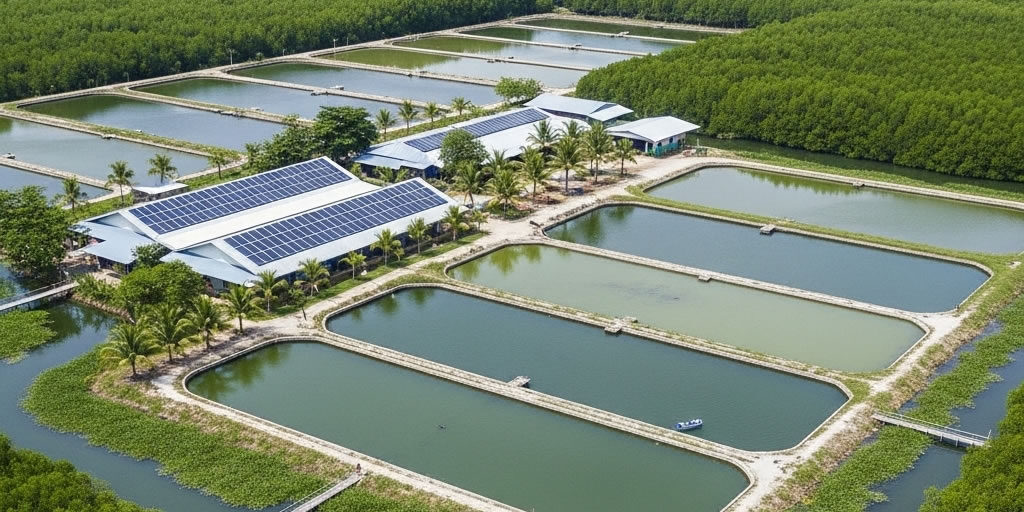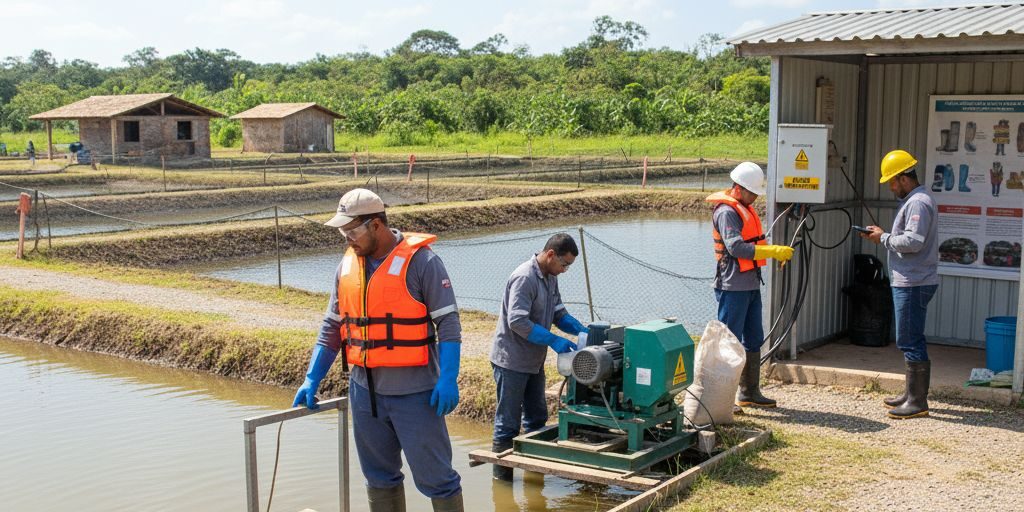- Software Gestor para Aquicultura
- (85) 2139-6730
- contato@despesca.com.br
Environmental Licensing for Aquaculture in Brazil

White Spot & IHHNV
19/08/2025
Aeration and Water Renewal: The Definitive Guide to Maximize Production and Reduce Costs
21/08/2025The Definitive Guide to Keeping Your Farm Compliant
Brazilian aquaculture, especially shrimp farming (carciniculture), has emerged as a sector with immense economic and social potential. However, to ensure sustainable growth and business longevity, producers must focus on an essential pillar: environmental compliance. Environmental licensing is not just a legal obligation but a strategic tool that opens doors to more demanding markets, facilitates access to credit, and strengthens a farm’s image in the eyes of consumers and society.
In this definitive guide, prepared by the Despesca team, we will detail the step-by-step process of environmental licensing, focusing on the specifics of shrimp farming, so that you, the producer, can navigate this journey with confidence and peace of mind.
Why is Environmental Licensing Crucial for Your Farm?
Many producers still view licensing as a bureaucratic and costly process. However, approaching it as a strategic investment changes the entire perspective. A properly licensed farm demonstrates a commitment to sustainability and socio-environmental responsibility—factors that are increasingly valued in the global market.
The main benefits of environmental compliance include:
- Legal Security: Operating with all licenses up to date prevents heavy fines, production embargoes, and other sanctions that can compromise the financial health of your business.
- Access to Credit and Financing: Financial institutions, such as the Bank of Northeast Brazil (Banco do Nordeste), require environmental compliance to grant rural credit and specific financing for aquaculture.
- Market Access: Major supermarket chains, restaurants, and especially the export market, require proof of sustainable production, which includes environmental licenses.
- Improved Management: The licensing process demands detailed production planning, from water use to effluent management. This encourages producers to adopt best practices, resulting in greater efficiency and productivity.
- Brand Valorization: Sustainable production adds value to your product and strengthens your brand’s reputation in the market.
Demystifying the Process: A Step-by-Step Guide to Licensing
Environmental licensing for aquaculture is managed by state environmental agencies. In Northeast Brazil, a powerhouse of shrimp farming, the responsible institutions include the State Superintendence for the Environment of Ceará (SEMACE), the Institute for Sustainable Development and Environment of Rio Grande do Norte (IDEMA), and the State Agency for Environment of Pernambuco (CPRH).
The process is generally three-phased, consisting of three distinct and sequential licenses. Furthermore, an indispensable preliminary step is the Water Use Permit (Outorga de Direito de Uso de Recursos Hídricos), which authorizes the capture of water for the enterprise. Without it, the environmental licensing process cannot proceed.
1. Preliminary License (Licença Prévia – LP)
This is the first stage, conducted during the project’s planning phase. The LP certifies the environmental feasibility of the project and approves its location and design, establishing the basic requirements to be met in the subsequent phases.
Commonly required documentation:
- Formal application to the environmental agency.
- Proof of property ownership or possession.
- National Registry of Legal Entities (CNPJ) or Individual Taxpayer Registry (CPF).
- Land use and occupation certificate issued by the municipal government.
- Environmental studies, such as the Environmental Control Report (RCA) or, for larger projects, the Environmental Impact Assessment and its respective Environmental Impact Report (EIA/RIMA).
- Technical Responsibility Annotation (ART) from the professional responsible for the project.
2. Installation License (Licença de Instalação – LI)
With the LP in hand, the producer is authorized to begin farm construction. The LI authorizes the installation of the enterprise according to the specifications in the approved plans, programs, and projects, including environmental control measures.
Commonly required documentation:
- Copy of the Preliminary License (LP).
- Application for the Installation License (LI).
- Submission of the Basic Environmental Plan (PBA), detailing construction plans and impact mitigation measures.
- Proof of compliance with the conditions set in the LP.
- ART from those responsible for executing the construction.
3. Operation License (Licença de Operação – LO)
After the completion of construction and verification of the effectiveness of the environmental control measures, the LO authorizes the start of production activities. This license must be renewed periodically, and its validity period varies according to state legislation.
Commonly required documentation:
- Copy of the Installation License (LI).
- Application for the Operation License (LO).
- Report proving compliance with the LI’s conditions.
- Environmental Monitoring Plan.
- Federal Technical Registry (CTF) with IBAMA (Brazilian Institute of Environment and Renewable Natural Resources).
Focus on Shrimp Farming: Key Points of Attention
Shrimp farming has specific characteristics that require special attention during the licensing process. The main environmental concern is related to the management of pond effluents, which can be rich in organic matter and nutrients.
Key challenges and how to prepare:
- Effluent Treatment: It is crucial to include an efficient system for treating harvest water in your project, such as sedimentation basins. State regulations, like COEMA Resolution No. 9/2021 in Ceará, establish specific standards for the discharge of these effluents.
- Location: Federal legislation, through CONAMA Resolution No. 312/2002, prohibits the installation of shrimp farms in mangrove areas. It is critical to respect Permanent Preservation Areas (APPs).
- Biosecurity: Presenting a robust biosecurity plan, detailing measures for disease prevention and control, is a differentiating factor that demonstrates the producer’s responsibility. To learn more about the importance of health management in your production, check out our article on Shrimp Farming Sanity.
Managing Deadlines and Documents with Despesca
The licensing process doesn’t end with obtaining the LO. Licenses and permits have expiration dates and require renewal. Missing an important deadline can lead to the suspension of activities and the application of fines.
This is where technology becomes the producer’s greatest ally. A management software like Despesca is essential for maintaining full control over your farm. The system features a tool dedicated to managing deadlines and documents, which sends alerts for the expiration dates of licenses, permits, and other important certificates. With Despesca, you ensure that your farm always operates in compliance, avoiding unpleasant surprises and allowing you to focus on what truly matters: producing with quality and efficiency.
Conclusion: To Comply is to Grow
Environmental licensing is an irreversible path for modern and competitive aquaculture. More than a legal requirement, it is a seal of quality that attests to the producer’s commitment to the environment, society, and the future of their own business. By understanding the process, preparing the documentation correctly, and using management tools like Despesca to organize your deadlines, the journey to compliance becomes simpler and the benefits, immeasurable. Keep your farm compliant and be ready to reach new heights of success.




